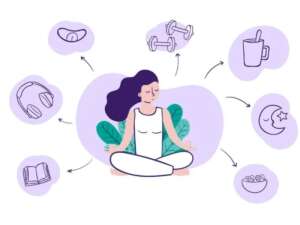
Self-care may sound like a buzzword to encourage you to visit a spa, but it’s actually a critical part of your health and wellness that you shouldn’t neglect. You may feel like you’re too busy taking care of everyone else to practice self-care, but the truth is that taking care of yourself helps keep you healthy, happy and charged up so that you are better able to care for others. With that in mind, let’s take a closer look at self-care.
Self-care is about taking care of your body, mind and soul by doing things that keep you healthy and reduce stress. While self-care could mean going to a spa or getting a massage, it also includes things like eating right, exercising, reading or tackling an item on your to-do list.
Self-care is not only important, but it can be life saving too. If you don’t take care of yourself, you will have a lower quality of life, a shorter lifespan and less ability to care for others. We all know we need to eat right and exercise to be healthy, but did you know that managing stress is another big part of self-care?
Stress can cause or contribute to a number of health problems, including hypertension, heart disease, obesity, diabetes, anxiety, depression, menstrual problems, gut dysbiosis, skin conditions like eczema, hair loss and even cancer. That means stress isn’t just negatively impacting your life right now. Unmanaged stress may cause lifelong problems that could shorten your life.
Self-care is about handling both your physical and emotional wellbeing, which is why it is so important. A good self-care routine should include things that improve your physical, emotional and mental health. A self-care plan might consist of things like exercising, eating clean, healthy food, getting sufficient sleep, avoiding or limiting the use of drugs like alcohol and caffeine, reading, painting, dancing, singing, taking walks, practicing yoga or meditation and even having a daily hygiene routine.
Here are some of the easiest ways to practice self-care that you can do almost anywhere.
1. Breathe – Intentional breathing can calm the mind, oxygenate the blood, reduce symptoms associated with anxiety and lower cortisol levels. When we become stressed, our breathing can become rapid and shallow, which reduces the amount of oxygen in our blood and can increase cortisol levels. It’s important to recognize when this is happening. When we learn to recognize breathing patterns, we can also become intentional with our breath, slowing it down and taking deeper breaths to help calm the nervous system.
It can be difficult to slow our breathing when we’re feeling triggered, so it’s a good idea to get into a comfortable position, such as lying down. Once you’re in a comfortable position, you can relax the diaphragm and take deep intentional breaths to a count of three or four, then exhaling to a count of three or four. If you’re unable to lie down, you can close your eyes and still utilize intentional breathing techniques almost anywhere.
2. Move – Exercise is important to everyone’s overall health and wellness. Regular exercise can manage blood pressure, reduce cholesterol levels, improve digestion, manage weight and lower cortisol levels. Many people only consider exercise as the time they spend lifting weights, running on a treadmill or taking an aerobics class. However, there are many activities that can have the same effect.
Hiking is a great activity because it encourages you to be outdoors in nature. There are hiking trails for all fitness levels and walking among nature can have a meditative effect. Many other outdoor activities can also have improved mental, physical and emotional benefits. Consider biking, paddleboarding, kayaking, tai chi, swimming, jogging or walking.
3. Reflection – Journaling can be very cathartic in processing our emotions. It can also provide insight into our triggers and our unconscious thoughts. Writing down how we feel, what we’re thinking and what transpired will free up space and allow our mind to flow freely. When we allow ourselves the space for our thoughts, we have more resources to discover creative solutions to the challenges we face. Most importantly, when we free up our minds by writing down our thoughts and emotions, we can improve the quality of our sleep because our mind is not running.
Journaling can take many forms these days and most people prefer a keyboard over a pen and pad. However, pen and paper writing can actually be more effective because the physical act of writing has a better effect at allowing the mind to wind down. It also utilizes more energy, which allows for the nervous system to calm down in preparation for rest.
The key to any self-care practice is to feel nourished by the activity. The goal is to find some peace, gain a little separation from the stressors of the world and recharge your batteries. It’s particularly important around the holidays when there always seems to be added stressors in everyone’s life. So figure out what works for you and utilize it as often as possible. And don’t dismiss a good massage, an acupuncture treatment or a day at the spa. Those can be just as helpful in maintaining your overall health.

